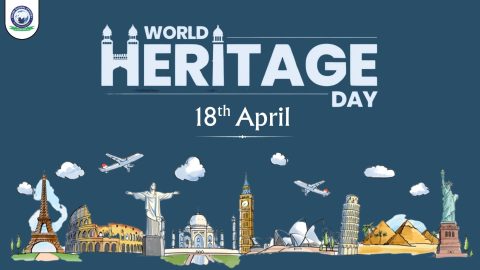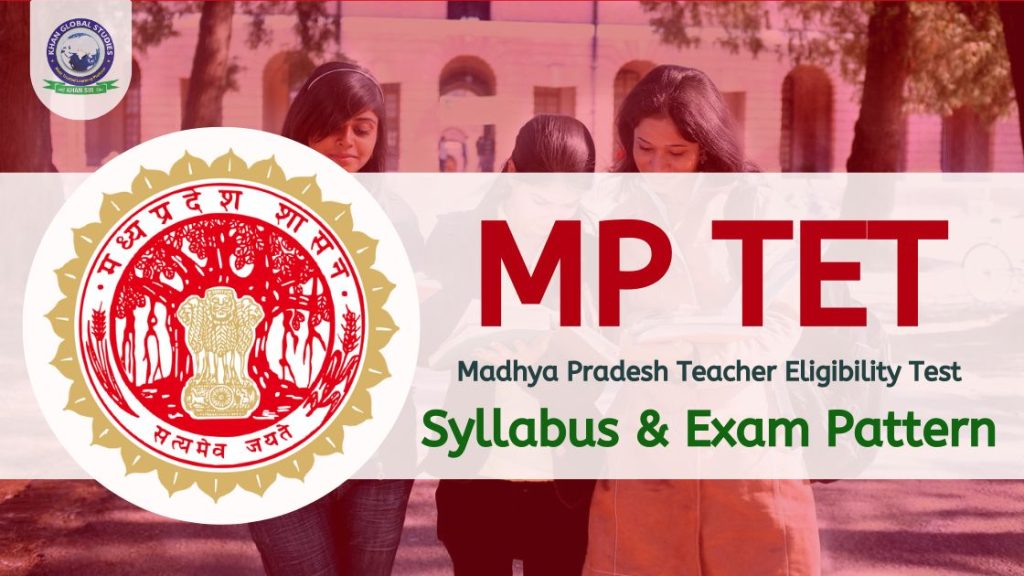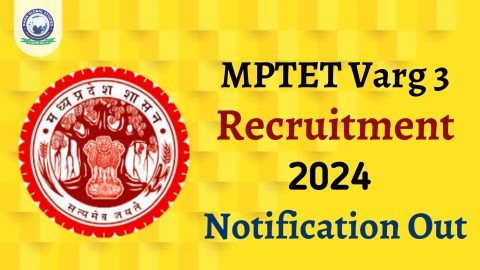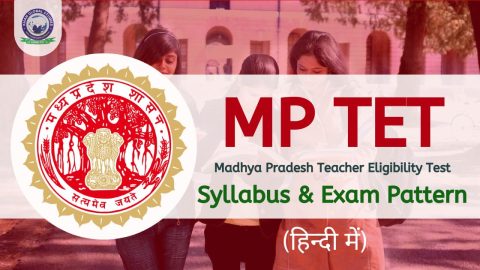MP Middle School Teacher and MP High School Teacher Eligibility Test (MPTET) syllabus and exam pattern for Madhya Pradesh state has been made available on the official website. Candidates have started preparing for both the exams. The MPTET exam pattern states that the exam will have a total weightage of 150 marks. The written examination will include subject-oriented questions and inquiries about General Knowledge, Current Affairs and English Language. We will know about the MPTET exam pattern and syllabus in detail here.
MP TET Overview
Candidates aiming to crack the MPTET exam 2023 must understand the MPTET syllabus and exam pattern well. For updated MPTET Syllabus 2023, candidates should make a habit of frequently visiting this page.
| Conducting Body | Madhya Pradesh Professional Examination Board (MPPEB) |
| Exam Name | Madhya Pradesh Teacher Eligibility Test (MPTET) |
| Post Name | High School Level Teachers and Middle School Teachers |
| Selection Process | Written Test |
| Exam Duration | 2 Hours 30 Minutes (150 Minutes) |
| Official Website | https://esb.mp.gov.in/ |
MP TET Syllabus
General Hindi, General English, General Knowledge and Current Affairs, Reasoning and Numerical Ability, Pedagogy and everything related to the subject is included in the comprehensive MP TET General Paper syllabus in PDF format. Candidates are advised to follow the MP TET syllabus 2024 given in this article for optimum exam preparation.
MPTET Varg 1 Syllabus
Hindi:
- विराम चिह्न
- संज्ञा
- सर्वनाम
- काल
- क्रियाएं
- वाक्यों के प्रकार
- अनदेखी समझ
- प्रमुख हिंदी लेखक और उनकी जीवनी
- प्रमुख हिन्दी कवि एवं जीवनी
English:
PART A:
- Articles
- Prepositions
- Conjunctions
- Modals
- Adverbs
- Tenses
- Clauses
- Number
- Gender
- Pronoun
- Figures of Speech
- Different forms of poetry
PART B: Fiction:
- Pride and Prejudice
- A tale of two cities
- Bye bye blackbird
- A portrait of the lady
Drama:
- Arms and the man
- The Tempest
- Hamlet
- The poet and pauper
- Gitanjali
- True worship
Poetry:
- Ode to Skylark
- The Broken Wings
- The world is too much with us
- The solitary reaper
- Tables turned
- The last ride together
- After apple picking
- The road not taken
- Stopping by the woods on a snowy evening
- The Gitanjali
- Words worth I wandered as a lonely cloud
Prose:
- Of Studies
- Of Friendship
- William Hazzlitts fathers letter
- Dream children
- Teenage
- Discovery of India
- My mother
Short story:
- Swami and Friends
- The guide
- The lost child
Sanskrit:
- समास
- शब्द रूप
- संधि
- प्रत्यय
- धातरूप
- शय्या, वेदांग, पुराण
- रामायण और महाभारत
- षटदर्शन
- संस्कृत का इतिहास
- संस्कृत भाषा के प्रमुख व्यक्तियों की जीवनियाँ
- अलंकार
- रास
- कारक
- संस्कृत से हिंदी वाक्य (अनुवाद)
- निबंध लेखन
- गिनती/संख्या
Urdu:
- Grammar
- History and growth of urdu language
- Writing skills
- Unseen and seen passages
Mathematics:
- Arithmetic
- Algebra
- Linear Inequalities
- Relationship and work
- Determinants and Matrices
- Geometry
- Coordinate Geometry
- Scalar and Vector Quantities
- Mensuration
- Trigonometry
- Figures
- Arithmetic Logic
- Sequence and Series
- Differentiation and Integration
- Elementary Number Theory
- Differential Equations
- Mathematical Induction and Binomial Theorem
- Linear Programming
- Algebra and Trigonometry
- Vector Analysis and Geometry
- Situation Science
- Dynamics
- Real Analysis and Complex Analysis
- Setric Space
- Abstract-Algebra
Physics:
- Physical World and Measurement
- Kinematics
- Laws of Motion
- Work, Energy and Power
- Motion of System of Particles and Rigid Body
- Gravitation
- Properties of Bulk Matter
- Thermodynamics
- Oscillations and Waves
- Electrostatics
- Current Electricity
- Magnetic Effects of Current and Magnetism
- Electromagnetic Induction and Alternating Currents
- Optics
- Modern Physics
Biology:
- Diversity in the Living World
- Structural Organization in Animals and Plants
- Cell Structure and Function
- Plant Physiology
- Human Physiology
- Reproduction
- Genetics and Evolution
- Biology and Human Welfare
- Biotechnology and its Applications
- Ecology and Environment
Chemistry:
- Basic Concepts
- States of Matter
- Structure of Matter
- Equilibrium
- Surface Chemistry
- Chemical Kinetics
- Redox, Reaction and Electrochemistry
- Solutions
- Chemical Bonding and Molecular Structure
- Thermodynamics
- Classification of Elements and Periodicity in Properties
- General Principles and Processes of Elements
- Hydrogen
- P-Block.Elements
- D and F Block Elements
- Combination Compounds and Organometallic
- Organic Chemistry
- Hydrocarbons
- Environmental Chemistry
- Haloalkanes and Haloarenes
- Alcohols, Phenols and Ethers
- Aldehydes, Ketones and Carboxylic Acids
- Organic Compounds containing Nitrogen
- Polymers
- Biomolecules
- Chemistry in Everyday Life
Home Science:
- Home Management
- Food and Nutrition
- Anatomy
Commerce:
- Introduction to Business
- Forms of Business Organizations
- Business Services
- Trade
- Business Finance
- Management
- Business Environment
- Management function
- Business Finance
- Financial Market
- Human Resource Management
- Marketing
- Emerging Trends in Management
- Consumer Protection
- Accounting
- Process of Accounting
- Accounting for Joint Stock Companies
- Accounting for Liquidation
- Financial Statement Analysis
- Fund Flow Statement and Cash Flow Statement
- Cost Accounting
- Computers in Accounting
- Accounting and Database Management System
History:
- Meaning of History, Survey and Sources to Gather History
- Prehistoric Hunters and Gatherers
- Palaeolithic and Mesolithic Culture
- Harappan and Late Harappan Civilisation
- Development and Fundamental Studies of Religious and Philosophers’ Views
- Origin and Expansion of Territorial States
- Political History of Several Periods
- Medieval Indian History
- Mughal Empire
- The advent of Europeans and the Establishment of British Rule in India
- Social Development
- Development of Art and Study
- Unification of Germany
- Unification of Italy
Geography:
- Physical Geography
- Economic Geography
- Human Geography
- Geography of India
- Practical Geography
Political Science:
- Power and Authority
- Citizenship Rights
- Democracy
- Constitution
- Union Government
- Election Commission
- State Government
- Union Government
- Indian National Movement
- National and Regional Parties
- Nature of Political Thoughts
- Political Thought
- World Government Thinker
- India and International Relations
- Public Administration
Economics:
- Economics
- Consumption and Utility
- Demand and Supply
- Production
- Market and Price Determination
- Distribution
- Concept and Theories of Money
- Structure of the Indian Economy
- National Income and Accounts
- Public Finance
- Banking
- Trade
- Statistics
Agriculture:
- Importance of Agriculture
- Crop water Relationships
- Animal Husbandry
- Soil and Water Management
- Plant Morphology
- Economics concerning Agriculture
- Agricultural Extension
- Physics, Chemistry and Mathematics used for Agriculture
- Computer in Agriculture
Sociology:
- Social change and Social processes
- Indian Society
- Rural and Urban Sociology
- Sociology of Tribal Society
- Contribution of Thinkers in Sociology
- Methods of Social Research
- Mass Media and Cultural Change
MPTET Varg 2 Syllabus
Child Development & Pedagogy:
- Child Development
- Concept of Inclusive Education and understanding of children with special needs
- Learning and Teaching (Pedagogy)
Hindi Language:
- Linguistic Comprehension
English Language:
- Reading Comprehension
- Vocabulary
- Functional Grammar
- Writing
Mathematics:
- Number system
- Algebra
- Geometry
- Creations
- Mensuration
- Statistics
- Pedagogical issues
- Development of thinking and reasoning power through mathematics lessons
- Place of mathematics in the curriculum
- Language of mathematics
- To develop the ability to create and use environment-based appropriate educational aids for effective teaching.
Science:
- Content
- Pedagogical Issues
Social Science:
- History
- Civics
- Geography
- lithosphere Atmosphere
- Hydrosphere
- Economy
- Note: Five-year plans and agricultural development of India. Rural Economy, Food Security Services, Consumer Protection.
- Pedagogical Issues
Hindi:
- वाकय बोध
- काव्य बोध
- अपठित बोध
- निबंध लेखन
- पत्र् लेखन
- हिन्दी साहित्य
- हिंदी गद्य और उसका विकास
Sanskrit:
- व्याकरण,
- संस्कृत निबंध लेखन एवं अनौपचारिक पत्र एवं प्रार्थना पत्र लेखन,
- वेद वेदांग पुराण अवं उपनिषद का सामान्य परिचय,
- संस्कृत के प्रतिनिधि काव्यों का परिचय,
- करक एवं विभक्तियों का सामान्य परिचय,
- हिन्दी वाक्यों का संस्कृत में अनुवाद करना,
- संस्कृत अपठित गद्य एवं अपठित पड्या का हिंदी अनुवाद,
- अवं पाठ्यांश पर आधारित प्रश्न
Urdu:
1. भाषायी समझ
- गद्य (नसर) की विधाएं
- मकतूब निगारी, दास्तान, अदबी तारीख, मुखतसिर अफसानें, रिपोरताज, इन्शाईया, तन्जो सफ़र नामा, खाका ।
- मुआविन मताला – यादें, आपबीती मजमून, कहावतें
2. पद्य ( नज्में) गजले (मसनवी, कसीदा, मरसिया नज्मे रुबाई तवील नज्मे अली सरदार जाफरी की वक़्त का तराना 3. व्याकरण ( कवायद ) ” – मजाह, हरूफ शमसी, हरूफ कमरी, हरकात व सकनात रमूज औकाफ, साबके लाहके, सिफत, तजाद, तजाहले आरिफ़ाना, हरके अतफ मजाज मूरसिल, कहावते, मुहावरे वाक्य में प्रयोग, तजनीस (ताम, जायद नाकिस) कनाया, लफ व नशर।
4. निबंध लेखन (मजमून )
5. पत्र / प्रार्थना पत्र ( खत व दरख्वास्त)
6. गैर दरसी इकतिवास (अपठित) की तशरीह व उस पर आधारित प्रश्न
7. उर्दू साहित्य का इतिहास (गद्य व पद्य का विकास) भाषायी विकास हेतु निर्धारित शिक्षाशास्त्र व पढ़ाने के तरीकों पर प्रश्न
- उर्दू शिक्षण की आवश्यकता व उद्देश्य
- अच्छे उर्दू शिक्षक की विशेषताएं
- भाषा शिक्षण के सिद्धांत
- तरीका-ए-तदरीस, नम्र व नज्म की विभिन्न विधाओं का (असनाफ़) शिक्षण
- ए उर्दू सीखना और समझना (सुनना, बोलना, पढ़ना लिखना चारों महार
- उर्दू भाषा की चारों महारतों का मूल्यांकन
- भाषा शिक्षण में सुनने और बोलने की अहमियत, बच्चों के ज़रिए उर्दू भाषा का प्रयोग
- ज़बानी और तहरीरी (लेखन) में कवायद का इस्तेमाल
- क्लासरूम में तालीमी इस्तेदाद वाले बच्चों को जबान सिखाने में आने वाल
- मुशकिलात दूर करके गलतियों को चुनौती की तरह लेकर पढ़ना सिखाना
- क्लास में किताब, अमदादी अशिया, मल्टीमीडिया मटेरियल समई – बसरी आलात व विभिन् स्तर व कक्षा के बच्चों को पढ़ाना खुसीसी तदरीस (विशेष पुनः शिक्षण)
- कवायद (ग्रामर ) :- इस्म, जमीर, जमीर की किस्में, फेअल फेअल की अकसाम, जिस, जम जुमला सिफत, तज़ाद, साविका, लाहेका, वाहिद जमा मुजक्कर, मोअन्नस, मुहावरे ब लाज़िम मुतअददी, मारूफ मजल गजल, कतआ, रुबाई, मसनवी, नज़्म, तशबीह, तल इस्तिआरा, सनअते तजाद मतला, मकता, रदीफ़, काफिया वगैरा |
- गैर दस इक्तिबास
- दरख्वास्त और खुतूत नवीसी मजमून नवीसी।
Physical Education:
- History of Physical Education
- About the body’s education
- Anatomy and Physiology
- Physiology or Science
- Origin of the Olympic Movement and the Olympic Games
- Yoga
- Introduction to Sports Coaching
- Organization and Governance in Physical Education
MPTET Varg 3 Syllabus
Child Development and Pedagogy:
1. Child Development
- The concept of child development and its relation to learning.
- Factors affecting growth and development.
- The principles of child development
- Mental Health and behaviour problems of children
- Concept of child-centred and progressive education
- Critical nature of mind and its measurement, and multi-dimensional mind.
- Language and thought
- Personality and its measurement
- Gender as a social construction, role of gender, gender discrimination, and educational practices
- Individual differences among learners, understanding differences based on diversity of language, caste, gender, community, religion, etc.
- Assessment of learning and its alterations based on class.
- Formulating appropriate questions for assessing the readiness levels of learners; enhancing learning and critical thinking in the classroom and assessing learner achievement.
2. Concept of Inclusive Education and Understanding Children with Special Needs
- Child Crimes: Types and Causes
- Identifying the needs of children with disabilities and learning difficulties.
- A Troubled Child: Identification and Diagnosis
- Addressing the creative, talented, and special-abled learners.
- Addressing learners from diversified backgrounds including disadvantaged and deprived.
3. Learning and Pedagogy
- Motivation and Learning
- Cognition and Emotions
- Factors contributing to learning- personal and environmental
- Guidance and Counseling
- Aptitude and its measurement
- Memory and Forgetfulness
- Alternative concepts of learning
- A child as a problem solver and explorer
- The fundamental process of teaching and learning
- Children learn and the reason for failure and success.
Language I (Hindi)
1. भाषायी समझ बोध, व्याकरण, और मौखिक क्षमता के साथ दो अपठित गद्यांश
2. भाषा विकास का शिक्षण
- भाषा सीखना और ग्रहण शीलता
- भाषा शिक्षण के सिद्धांत
- भाषा शिक्षण में बोलने और सुनने की भूमिका, भाषा के कार्य और बच्चे भाषा का प्रयोग कैसे करते है
- मौखिक और लिखित अभिव्यक्ति के अंतग्रत भाषा सिखने में व्याकरण की भूमिका
- भाषा शिक्षण में विभ्भिन स्तरों के बच्चों की चुनौती, कठिनाई, ऋतुयां , और क्रमबद्धता
- भाषा के चारों कौशल
- पुःन शिक्षण
- कक्षा में शिक्षण अधिगम सामग्री: पाठ्यपुस्तक, दूर संचार, और बहुकक्षा स्त्रोत।
Language II (English)
- Comprehension Two unseen prose passages with questions on comprehension, grammar, and verbal ability.
- Pedagogy of Language Development
- Learning and Acquisition
- Principles of the Second Language Training
- Language skills- reading, writing, and speaking
- Remedial Teaching
- The role of grammar in learning a language for communicating ideas verbally and in writing form
- Challenges of teaching a language in a diversified classroom
- Teaching-learning materials, textbooks, multimedia materials, multilingual resources of the classroom.
Mathematics
1. Content
- Geometry
- Solid Around Us
- Number System
- Addition and Subtraction
- Multiplication
- Division
- Fraction
- Measurement
- Weight
- Time
- Volume
- Data Handling
- Patterns
- Money
2. Pedagogical Issues
- Nature of Mathematics/Logical Thinking
- Place of Mathematics in Curriculum
- Language of Mathematics
- Community Mathematics
- Evaluations through Formal and Informal Methods
- New Methods for Teaching Mathematics in the Classroom
- Problems of Teaching
- Diagnostic and Remedial Teaching
- Error Analysis and Related Aspects of Learning and Teaching
Environmental Studies:
1. Content
a. Family and Friends
- Family and Social Relations
- Animals and Birds
- Trees and Plants
- Natural Resources
b. Sports and Activities
- Science, Yoga, and Sports
- Family Festivals
- Several business and industrial occupations
c. Space Science
- Space scientists and their life experience
- Science Facts
- Space discoveries, space shuttle, and predictions
d. Food and Habits
- The necessity for food and its components
- importance of fruits and plants
- A healthy combination of food items
- Measures for food safety and hygiene
- Food for various age groups
e. Natural objects and yields
- Important agriculture works and equipment
- Crops and their production
- Importance of soil, water, fertilizers, crops and seeds
f. Human-made tools and their effect
- Effect of deforestation and urbanization
- Use of polythene and plastic
- Effect of using fossil fuels
- Disaster Management
g. Water and Air Pollution and Infections
- Study of climate, water cycle, and their effects
- Need for clean water and air
- Humans’ role in climate change
- Treatment and prevention of water and air pollution
- Protection of air, water, and soil
- Diseases caused by dirty and polluted air and water
- Sources of water, maintenance and methods of reserving water
2. Pedagogical Issues
- Environmental Studies: Concept and Need
- Importance of Environmental Studies and Integrated Environmental Education
- Environmental Studies: Fundamentals and Responsibilities
- Correlation of EVS to Science and Social Sciences
- Project work, surrounding tour, and their importance.
- Learning through group discussions, debate, group teaching, and presentation.
- Evaluation
- Training materials and their application in EVS
- Environmental problems in the local areas and their solutions
MP TET Exam Pattern
Candidates will be selected for the post through a written examination; Document verification will be followed. Candidates can review the comprehensive MPTET exam pattern of the written test below:
| MPTET Part A | Subject | No. of Questions | Maximum Marks |
| 1 | General Hindi | 8 | 8 |
| 2 | General English | 5 | 5 |
| 3 | General Knowledge and Current Affairs, Reasoning and Numerical Ability | 7 | 7 |
| 4 | Pedagogy | 10 | 10 |
| MPTET Part B | Subject Concerned | 120 | 120 |
| Total | 150 | 150 | |
MPTET Varg 2 Exam Pattern
| MPTET Part A | Subject | No. of Questions | Maximum Marks |
| 1 | Child Development and Pedagogy (Compulsory) | 15 | 15 |
| 2 | Language I (Hindi/Sanskrit) Anyone | 10 | 10 |
| 3 | Language II (English) | 5 | 5 |
| MPTET Part B | Concerned Subject | 120 | 120 |
| Total | 150 | 150 | |
How to crack the MP TET Exam?
MPTET exam preparation requires a strategic study plan that covers all the topics of the syllabus. Here are some hints on how to cover all MP TET syllabus:
- Understand the syllabus: Before starting the preparation, candidates should study the syllabus thoroughly and understand the topics covered in each subject.
- Plan a study schedule: Once the syllabus is clear, candidates should plan a study schedule that covers all the topics of the syllabus. Allocate adequate time to each subject depending on the level of difficulty and importance.
- Refer to the study material: Candidates should refer to quality study material including textbooks, reference books and online resources to cover the entire syllabus.
- Take Regular Mock Tests: Taking regular mock tests will help the candidates assess their preparation level and identify their weak areas. This will help them focus more on areas that need improvement.
- Revision regularly: Revision is important to remember what you have read. Candidates should revise the topics regularly to ensure that they do not forget what they have learned.
- Focus on Pedagogy: For Paper I, candidates should focus more on the Pedagogy of Child Development and Pedagogy and Language Development, as these are important topics in this paper.
- Solve Previous Year Question Papers: Solving previous year question papers will help candidates understand the exam pattern, type of questions asked and marking scheme.




